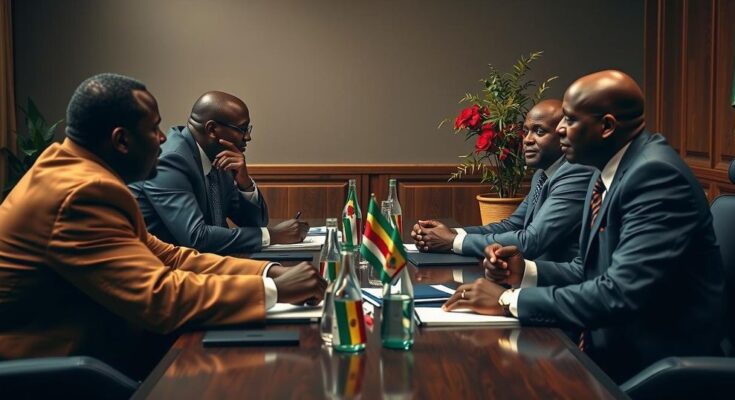Kenya and Uganda will mediate a territorial dispute between Ethiopia and Somalia, aimed at stabilizing the region. The disagreement involves Ethiopia’s plans for a port in Somaliland, seeking recognition amid tensions with the Somalian government. This situation has drawn Somalia closer to Egypt and has raised concerns over regional dynamics.
Kenya and Uganda are stepping up to facilitate dialogue between Ethiopia and Somalia regarding an escalating territorial dispute that jeopardizes regional stability. President William Ruto of Kenya announced this partnership with Ugandan President Yoweri Museveni as tensions rise surrounding Ethiopia’s military presence in Somalia, particularly in relation to Somaliland. The disagreement centers on Ethiopia’s intentions to construct a port in Somaliland in exchange for potential recognition of the territory’s sovereignty. Despite declared independence since 1991, Somaliland continues to seek international acknowledgment amid ongoing skirmishes for recognition.
This conflict has further strained relations within the region, notably drawing Somalia closer to Egypt, a long-time adversary of Ethiopia due to disputes over the Nile River and Ethiopia’s ambitious hydroelectric dam project. While previous mediation efforts in Ankara have not succeeded, both Kenya and Uganda view this mediation as critical for encouraging investment and business development in the region, as emphasized by President Ruto. Addis Ababa has yet to publicly respond to the calls for mediation, while efforts to reach Somalia’s foreign minister have also proved unsuccessful.
The ongoing dispute between Ethiopia and Somalia has considerable implications for East African stability. Ethiopia’s military presence in Somalia, aimed primarily at combating al-Qaeda-affiliated militants, has drawn criticism from the Somali government, particularly with respect to plans that could foster Somaliland’s aspirations for independence. Somaliland, which declared independence in 1991, operates autonomously but has not received official international recognition, making this conflict particularly complex. The geopolitical landscape is further complicated by historical rivalries in the region, such as Ethiopia’s longstanding tensions with Egypt over water and resource management linked to the Nile and the Grand Ethiopian Renaissance Dam.
In conclusion, the mediation effort proposed by Kenya and Uganda reflects a vital attempt to navigate the intricate dynamics of the Ethiopia-Somalia conflict. As tensions mount over the potential recognition of Somaliland and the implications for regional stability, the involvement of neighboring countries underscores the importance of cooperative diplomacy in addressing cross-border disputes in East Africa. Continued dialogue and mediation will be essential to reduce hostilities and foster a more stable environment conducive to investment and growth.
Original Source: www.usnews.com




